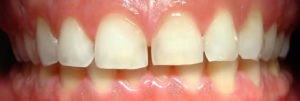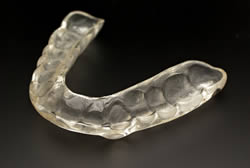Grinding Appliances
Tooth Grinding

Teeth grinding is a surprisingly common occurrence and can be a daytime issue but most often happens whilst asleep.
Most people are therefore unaware that they are grinding and only come to realise it when their partner complains of the noise the following morning.
- Other noticeable effects of grinding (bruxism) are:
- Fractured teeth and fillings
- Jaw pain and ear ache
- Facial and neck pain from muscle clenching
- Sleep disturbance – both yourself and partner
- Sensitivity to hot and cold drinks
Why do we grind?

Grinding (Bruxism) is a habitual behaviour and sleep movement disorder. The reason for grinding can be quite varied, from allergic reactions or medical ailments, to trauma (such as car crash) to a period of unusual stress. Certain medical conditions can trigger bruxism, including digestive ailments and anxiety. High levels of consumption of caffeinated drinks and foods, alcohol, smoking, and stimulants are associated factors.
Only an estimated 5% of people go on to develop symptoms such as jaw pain and headaches. You may also find that you suffer from jaw clenching, which if combined with grinding, will cause greater discomfort and damage to the teeth.
What are the consequences of grinding?
As you grind you end up biting harder and thus causing damage to the enamel on your teeth. It becomes a vicious circle as you can end up creating more damage to your teeth by initially wearing down the tooth’s enamel to gradually wearing down the tooth itself.
Bruxism is not the only cause of tooth wear, making it difficult to diagnose by visual evidence alone. Errosion from acidic foods and drinks can also cause teeth to become worn down. Worn down teeth are usually brought to the patients attention during routine dental examination.
What can be done about it?
As most grinding occurs during your sleep, the most common solution is the use of a mouth guard to prevent tooth damage. This helps reduce the pressure of tooth grinding and helps prevent further damage to your teeth.
Dietary advice to help prevent tooth errosion is important. Naturally, if your grinding is a result from stress then you should learn relaxation techniques and stress management.